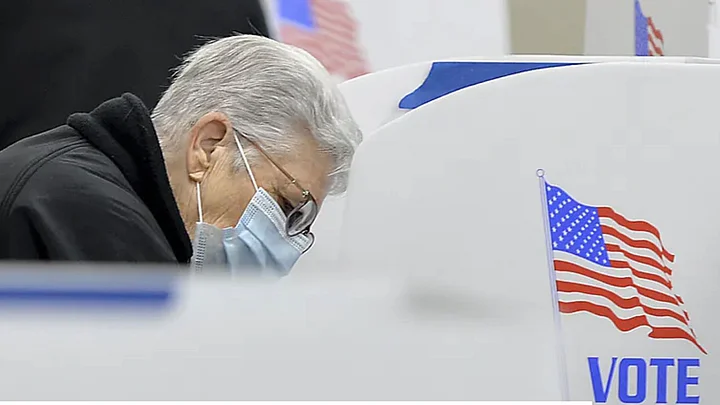With an election taking place in the midst of a pandemic and an incumbent president committed to undermining the integrity and legitimacy of the electoral process, voting day in the US is likely to be very different this year.
The most obvious difference is many Americans won’t actually be going to the polls because more than half of all voters have already cast their ballots, either by early in-person voting or mail-in voting.
How Many People Voted By Mail?
According to the US Elections Project, some 93 million Americans have already voted this year, more than 67% of the total votes cast in 2016.
And, notwithstanding President Donald Trump’s continual attempts to denigrate voting by mail, 63.5 percent of those early votes have been mail-in ballots.
Over 91 million mail-in votes have been requested in total this year and, as of the end of last weekend, almost 32 million were still yet to be returned.
This will undoubtedly delay the vote count in many states immediately after the election – meaning we may not have a clear winner today.
Arrangements for processing and counting mail-in votes differ from state to state, as does the length of time after 3 November that mail-in votes can be received. The US Supreme Court has complicated matters by supporting a post-election day extension in Pennsylvania and North Carolina, despite Republican attempts to block this. However, the court has denied any extra time for Wisconsin voters.
There are also massive problems with the capacity of the US Postal Service to deliver mail-in votes on time, due in no small part to Trump’s refusal to provide it with a bailout earlier this year. In August, he even claimed he was opposed to USPS funding increases because he didn’t want states to make it easier for Americans to vote by mail.
Because of the contentiousness of mail-in voting, which Trump claims without evidence will lead to widespread voter fraud, it will not be surprising if there are more lawsuits after the election over late vote counting. That, too, could delay the results even further.
When Would The Supreme Court Get Involved?
The Supreme Court has already been involved in this year’s election over deadlines for receipt of mail-in votes.
It is difficult to anticipate what other issues might reach the court by election day, but the Center for Public Integrity has identified hundreds of court cases across the US related to voter identification laws, signatures on mail-in ballots, felony disenfranchisement and a host of other issues designed to restrict and suppress voting.
Trump’s most recent Supreme Court nominee, Amy Coney Barrett, reinforces its conservative majority. There has been much debate over whether she should recuse herself from any case that involves Trump’s re-election, but, so far, she has refused to answer that question.
There could be legal challenges to any recounts, particularly in close battleground states, but it is unlikely there will be a repeat of anything like the court’s intervention in the 2000 presidential contest. Democrats now know what they need to do to sustain a constitutionally acceptable recount of votes.
Why Do Exit Polls Matter?
The other thing to watch on election day are the exit polls. With fewer people voting in person, the exit polls could be less reliable than in normal years.
Why does this matter? Exit polls are a vital ingredient in the mix of data that television networks use to project the winner in each state and, ultimately, the winner of the election.
Edison Research, which conducts exit polling for the major television networks, has already adapted its polling techniques to accommodate the record numbers of early voters.
But with fewer voters exiting the polls, the networks will still need to be more cautious than usual when projecting the winner – especially if the contest is close and turns on the outcome in a handful of states.
Could There be Violence?
Perhaps the most worrisome prospect is the spectre of violence on election day.
Trump has made an appeal for 50,000 volunteers to be present at polling locations to “monitor” the vote, an unsavoury practice that has long been associated with voter intimidation and suppression in the US.
For various complex reasons, a US District Court judge ruled in 2018 that a previous agreement between the two major parties not to intimidate or suppress minority voters could expire, which means the gloves are off this year.
According to a report in The Washington Post, Trump’s call for volunteers has prompted an enthusiastic response from neo-Nazis and right-wing activists, leading many state election and law enforcement officials to prepare for voter intimidation, arrests and even violence on election day.
When Will We Know Who Won?
The unique characteristics of this year’s presidential election mean the outcome may still be uncertain on the evening of 3 November (early afternoon on November 4 in Australia). It is also possible it could take two or three days before the result is known in the key battleground states of Michigan, Pennsylvania and Wisconsin.
Trump won the presidency in 2016 by less than 80,000 votes in those three states.
Democratic challenger Joe Biden is ahead in the polls in each of these states and, if he wins them, it is highly unlikely Trump will reach the 270 electoral votes needed to secure re-election.
If Biden ends up winning by a large margin on election night, the uncertainty will abate, as will the likelihood of any further legal challenges by Trump. But the prospect of this being apparent on election night is highly doubtful and the suspense of the 2020 presidential election may well continue for a few days more.
(This is an opinion piece and the views expressed above are the author’s own. The Quint neither endorses nor is responsible for the same. This article was originally published on The Conversation. Read the original article here.)
(At The Quint, we question everything. Play an active role in shaping our journalism by becoming a member today.)
